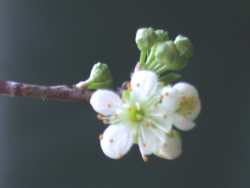To see the full World Day of Prayer 2006 Service, Click Here. The following was the "Reflection" provided by Gerald at the service held in Christopher Lake Saskatchewan on March 3.
World Day of Prayer Friday, March 3, 2006
Christopher Lake Christian Community hosting at St. Mary R.C. Church 2:00 P.M.Readings from Scripture:
Luke 21: 5-19
“ ... will be a day when not one stone will be left upon another – all will be thrown down.... but not a hair of your head will perish. By your endurance you will gain your souls.”Ezekiel 37: 1-10
“ ... set me in the middle of a valley; it was full of bones ... they were very dry. Mortal, can these bones live? Thus says the Lord God: Come from the four winds, O Breath, and breathe upon these slain that they may live .... and the breath came into them and they lived and stood upon their feet, a vast multitude.”Matthew 26: 6-13
“ By pouring the ointment on my body she has prepared me for burial. Truly I tell you, wherever the good news is proclaimed in the whole world, what she has done will be told in remembrance of her.”
I am holding a small branch of a pincherry bush. It appears to be quite dead. There are these tiny buds which seem so small and powerless, and which anyone can break off with a finger nail with no effort. As the early 20th century French poet Charles Peguy said in his poem, "The Mystery of the Holy Innocents," without those tiny buds on all the trees of the world, without those tiny buds which seem like nothing and have no power and no strength, all of creation would be nothing but an immense cemetery of dead wood.Good afternoon my friends.
I was given an advantage over you in considering this year’s theme; “The sign of the times” because Isabel gave me an advance copy of the prayer service. When I looked at it I was stunned. I found myself just laying the pamphlet aside to let my mind and heart slow down a bit. As soon as I picked it up again, the force, the power of the words of our scripture readings and the prayers of the women of South Africa washed over me in wave after wave.
It took me a long time to sort things out in my own heart and make a few decisions about which reflections I would try to share this afternoon. Yet, regardless of what I may say or do not say, the real power and the real reflection will be within each of you as you consider the word of God, as you reflect on the signs of the times, and as you consider the soul-shaking power of the prayers the women of South Africa are sharing with us today.
It was not a coincidence that we gathered here this day and began our service at 2:00 P.M. This is happening around the world and a tidal wave of prayer and reflection is rising from and around the earth. We have seen the destruction of a tidal wave of water in Asia and in the U.S. Gulf, let us pray that we see the healing and grace of God as our prayer wave moves around the earth. This is a sign of our times.
In thew passage from Luke that we read today, Jesus tells us about the coming destruction of the temple in Jerusalem. The temple represented God’s presence to the people of Israel. What Jesus foretold was unthinkable.
Try to imagine that every Christian minister is killed, every Christian church burned to the ground, every hymn book and every bible destroyed and any Christian gathering forbidden. Would our religion and faith survive such a destruction as no stone upon which we depend would be left upon another? Would our God still be with us? Would we still be able to find our God? That is what Jesus was predicting for his own nation. While the image I asked you to imagine might not actually happen, real equivalents are happening in the lives of individuals, in families, in communities and in nations every day. Great material, social, moral and political disasters come to our world today. Have we been touched by them? Do we know the despair of such signs of our times? i think we do.
Ezekiel was sharing his visions after the destruction of the temple in Jerusalem which happened after the second exile of his people to Babylon. There was nothing left that could give a shred of hope. Judah had sinned and God had abandoned the people. The only sign of the times people saw were a multitude of dry bones. These were a people who did not believe in resurrection so the dry bones represent an absolute and total end. To a people living an experience of absolute grief and despair, Jahweh spoke his instructions to Ezekiel. The sign held forth for a broken people of dry bones was the sign of the power of Jahweh. And the dry bones came together and new sinew and new flesh came onto those bones, and in a repetition of what Yahweh did at the beginning of creation, a wind, the breath of God, came from the four directions, and gave life to what was absolutely dead.
What are our versions of dry bones and despair? Is it the scourge of drug addiction or alcoholism in our family? What is beyond hope in our life? It is into that valley of dry bones that God will come and breathe the life of new creation. Because that is who our God is.
The reading from Matthew is actually sandwiched between two other significant passages. That points to its own very special importance. Just before the story of the woman from Bethany, we are told that all of the respected people of the Jewish nation, the scribes, the elders and the priests, had met to plan the death of Jesus. In the passage we read today, the disciples are angry at the unnamed woman’s prophetic sign of pouring costly oil over Jesus.
Then we are told that Judas Iscariot made up his mind, left, and went to the Chief Priest and asked what he would be paid for Jesus. He had given up on Jesus utterly. All of his hopes for what Jesus was supposed to be and do for him, for the disciples and the whole Jewish nation, had come crashing down. He despaired of Jesus and left with hatred in his heart. The sign he saw was a sign of total failure and collapse of such high hopes and dreams.
This passage that we read from Matthew is one of the few that tell of the role of women in the time of Jesus. It survived the retelling of the stories by many men and even the eventual writing of those stories by other men. For it to have survived points to its great significance. It was only a woman, and not even one who had always been with Jesus, who understood the real greatness of Jesus and who showed honour to that greatness. The men did not understand and could only find within the gesture, a source of petty conflict. It was also only women who would have the strength to stand under the cross and let their love testify to who Jesus was. When this woman anointed Jesus she was declaring that his real power would be revealed and released in his sacrifice and death.
Think once more about the wave of prayer building around the world today. Think about this wave whose energy our prayers are building into a huge tsunami of voices raised to God .. .to our God whose real power over death, destruction and all the sources of death on this earth, were revealed and released in an incredible wave of power through love that came from a mangled and broken body dying on a cross ... on a piece of a dead tree that finally made a permanent connection between earth and heaven. This is the only sign of our times that is worthy of our attention and the only sign that the women of South Africa hold up for us in prayer today.
The symbol they ask us to consider is young leaves. Well, for us today, that sign is still dormant in this branch and in these buds. As women and men of the north and as women and men of faith, we know the leaves will come forth to bring us our own signs of God in our times.
Thank you for this opportunity to share some thoughts with you.
Gerald Regnitter / Candesna Cun Wakan Oksina
What the "dead branch" looked like after a few weeks in water indoors:
Click for larger image view

